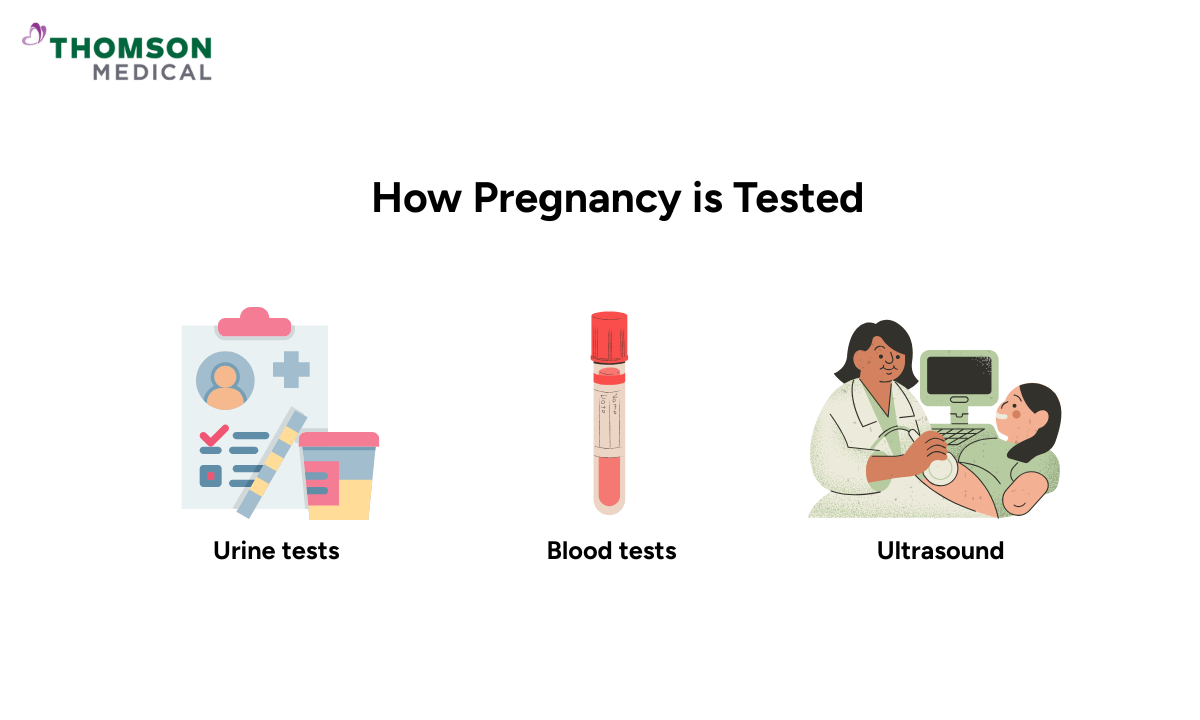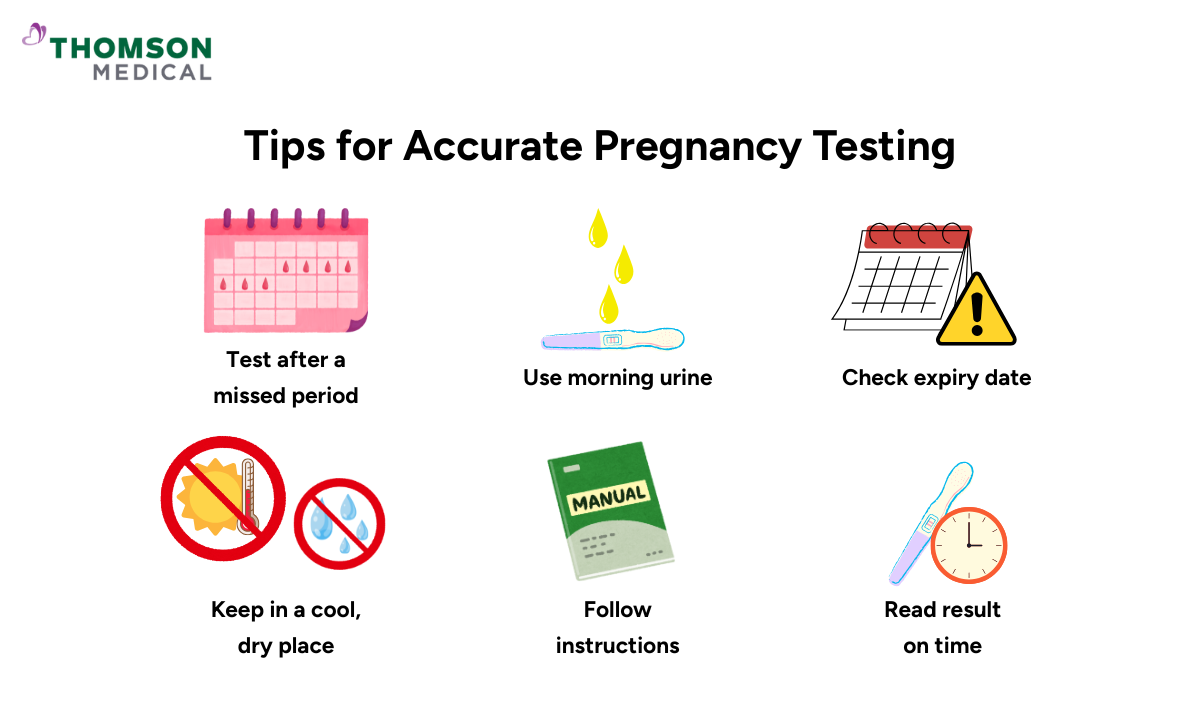A positive pregnancy test can be a very emotional moment. Most people believe it marks the beginning of a new chapter, although the outcome may not always be as expected.
A false positive pregnancy test is one that shows pregnancy when you aren’t actually pregnant yet. While this is not common, it can be a perplexing and disturbing situation.
Understanding why it happens and when to consult with a healthcare expert will help you take the appropriate next steps and make clear, informed decisions about your health.
What is a false positive pregnancy test?
A false positive occurs when a test indicates that you are pregnant, even if you actually aren’t. Most tests look for human chorionic gonadotropin (hCG), a hormone made after a fertilised egg attaches to the womb.
Home pregnancy tests are very sensitive and often reliable, but they are not perfect. Rare circumstances can trick them, which is why doctors advise having a second test to confirm any positive results. A blood test or ultrasound provides clearer answers.
How do pregnancy tests work?

Pregnancy tests look for hCG in urine or blood. The placenta begins to produce this hormone as soon as the embryo attaches, usually around 6 days after fertilisation. Levels rise quickly, usually doubling every couple of days in early pregnancy.
These are the common ways pregnancy is tested:
You can buy these over the counter. They are simple to use. The strip absorbs urine and reacts if hCG is present, showing lines, symbols, or a digital “Pregnant” screen. A control line confirms the kit is working.
Doctors run these in clinics. They are more precise and can pick up lower levels of hCG, sometimes before a missed period.
An ultrasound does not measure hormones; it shows whether a gestational sac is present. Doctors use this method when the pregnancy test results are uncertain or more confirmation is required.
Causes of a false positive pregnancy test
False positives are rare, but they do happen. Understanding the reasons helps cut down worry and guides your next step.
Chemical pregnancy
In a chemical pregnancy, an egg implants for a short time, hCG is released, and the test appears positive. But the pregnancy does not develop further. Hormone levels soon drop, and a period usually follows. Many people never realise they experienced it unless they tested very early.
Recent miscarriage or birth
After miscarriage, abortion, or childbirth, hCG does not disappear immediately. It can remain in the body for weeks. During that time, a test may still turn positive even though no new pregnancy exists.
When tissue remains in the womb after a miscarriage, known as retained products of conception, hCG levels may remain elevated for a longer period. In such cases, medical care may be needed to clear the tissue.
Medications
Medications may interfere with test results. For example, hCG injections used in fertility treatments can result in a false positive if tested too soon. Other medications may also reduce accuracy. These include diuretics, anticonvulsants, and anti-anxiety drugs. If you are unsure about when to test, consult your doctor.
Faulty tests or user errors
Faulty tests or human errors might also result in false positives. Common explanations include:
Use an expired kit.
Keeping the test in damp or hot areas.
Testing too soon.
Drinking too much water beforehand dilutes the urine.
Not following the directions carefully.
Another common issue is reading the test too late, when faint evaporation lines may develop. After the specified period, faint evaporation lines might appear, which can be misinterpreted for a positive result.
How to avoid a false positive pregnancy test

You cannot stop every false test result, but you can lower the risk. A few practical tips:
Test at least a week after a missed period.
Use your first urine in the morning.
Before using, check the expiration date.
Store the kit somewhere cold and dry.
Pay close attention to the instructions, following them exactly.
Examine the results just during the suggested time frame.
If you still suspect a false positive pregnancy test, repeat the test after two or three days or see your doctor for a blood test.
What to do if you are unsure
If your result is unclear, you can:
Retest after a few days, ideally with first-morning urine.
Use a different brand; digital tests often give clearer answers.
Speak to your GP or gynaecologist for a blood test.
Pregnancy tests can sometimes give unexpected results. If you’re unsure or have experienced a recent pregnancy loss, request an appointment with Thomson Medical specialist for accurate testing and personalised guidance.
When to contact a doctor
Reach out to a healthcare provider if:
Your results are unclear or keep changing.
You recently had a miscarriage and want to monitor hCG levels.
You have unusual pain, bleeding, or discharge.
Blood tests and ultrasound scans can quickly confirm what is really happening.
Our fertility specialists
Loading...
FAQ
What is the possibility of a false positive pregnancy test?
When used correctly, the chance of a false positive is under 1%. In most cases, a positive test means pregnancy; however, itis always recommended to double check with a doctor.
Is it possible to get a positive test and not be pregnant?
Yes. It can happen after a chemical pregnancy, a recent miscarriage or birth, or when medicines with hCG are involved. That is why follow-up matters.
Can too much urine make a pregnancy test positive?
No. Passing a large volume of urine will not create a false positive. But if your urine is diluted from drinking a lot of water, hCG levels may drop and lead to a false negative.
Can I be three months pregnant and still test negative?
It is very unlikely. By three months, hCG levels are high and almost always detected. A negative result at that stage should be checked by a doctor.
Can a test turn positive overnight?
Yes, but it is not a true positive. Tests should be read within the time given, usually five to ten minutes. A line appearing hours later is usually just an evaporation line.
What else can raise hCG if not pregnant?
Sometimes it is down to medication, especially fertility treatments. In rare cases, certain medical conditions may raise hCG. A doctor can check further if pregnancy is ruled out.
The information provided is intended for general guidance only and should not be considered medical advice. For personalised recommendations and tailored advice based on your unique situations, please consult a specialist at Thomson Medical. Request an appointmentwith Thomson Medical today.
For more information, contact us:
Thomson Specialists (Women's Health)
Thomson Women's Clinic (TWC)
- Novena:
6592 6686 (Call), 8611 8986 (WA) - Bukit Batok:
6569 0668 (Call), 8686 3525 (WA) - Choa Chu Kang:
6893 1227 (Call), 8282 1796 (WA) Jurong:
6262 8588 (Call), 6262 8588 (WA)- Katong (female doctor):
6970 2272 (Call), 8611 9020 (WA) - Punggol:
6243 6843 (Call), 8811 0328 (WA) - Sembawang: 6753 5228
- Sengkang: 6388 8125
- Serangoon (female doctor): 6382 3313
- Tampines: 6857 6266
- Tiong Bahru: 6276 1525
